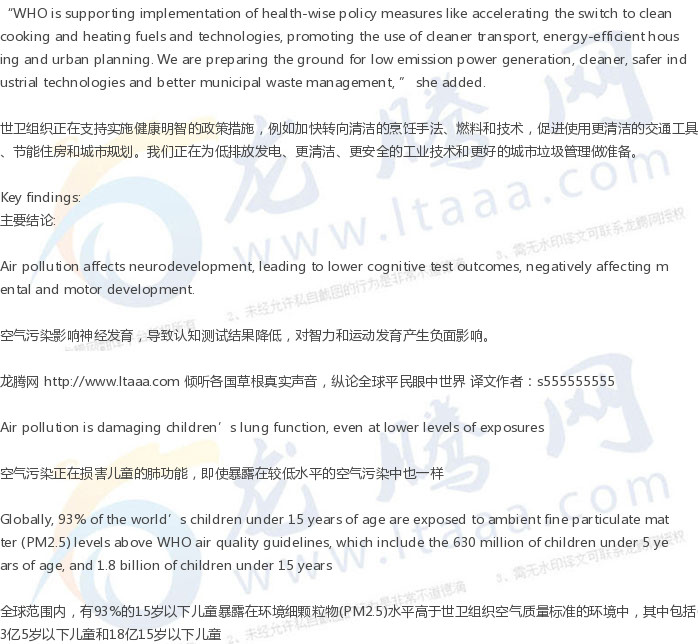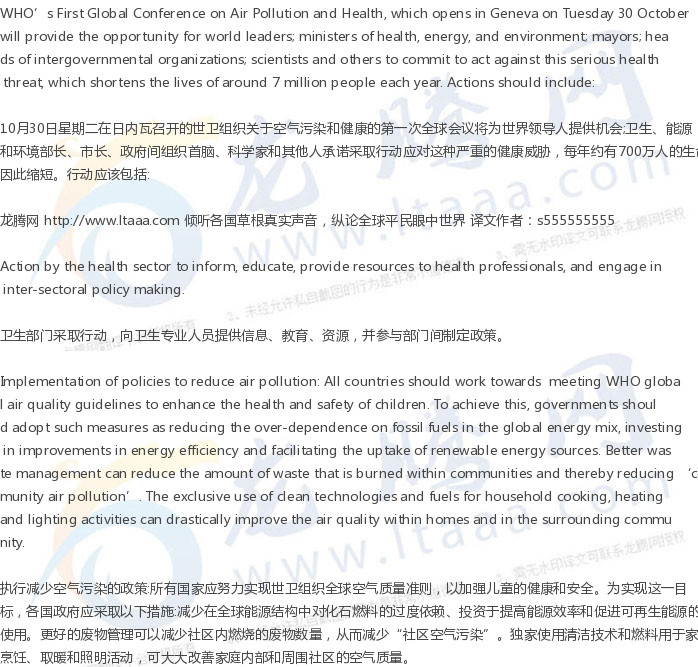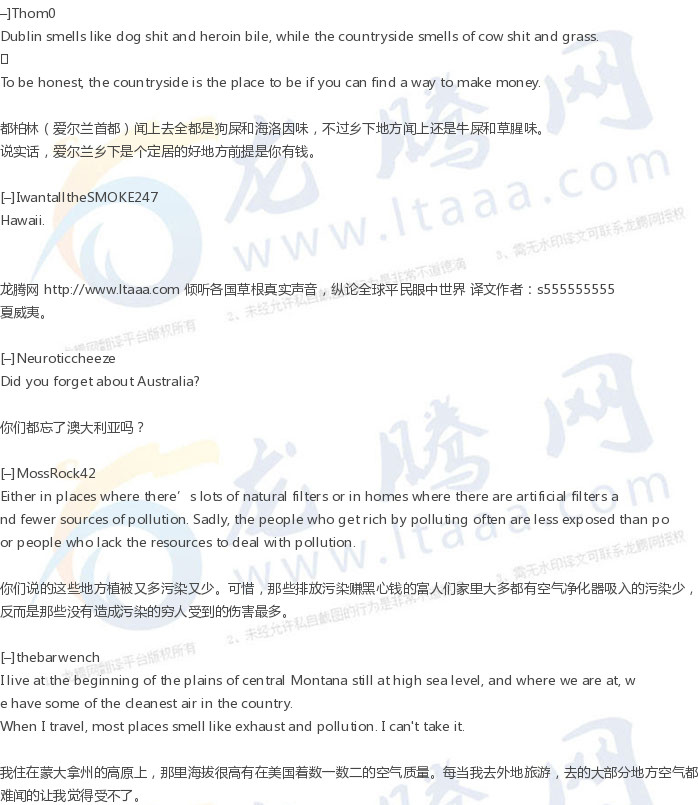全球有93%的儿童因空气污染而阻碍了大脑生长,许多儿童因此死亡。 [美国媒体]
每天,世界上93%的15岁以下儿童(18亿儿童)都在呼吸被污染的空气,严重到危及他们的健康和成长。不幸的是,许多因此儿童死亡:据世卫组织估计,2016年有60万儿童死于空气污染引起的急性下呼吸道感染。
Every day around 93% of the world’s children under the age of 15 years (1.8 billion children) breathe air that is so polluted it puts their health and development at serious risk. Tragically, many of them die: WHO estimates that in 2016, 600,000 children died from acute lower respiratory infections caused by polluted air.
每天,世界上93%的15岁以下儿童(18亿儿童)都在呼吸被污染的空气,严重到危及他们的健康和成长。不幸的是,许多因此儿童死亡:据世卫组织估计,2016年有60万儿童死于空气污染引起的急性下呼吸道感染。
They also live closer to the ground, where some pollutants reach peak concentrations – at a time when their brains and bodies are still developing.
由于儿童身高较低离地面更近,那里的一些污染物浓度达到了最高值——而这时他们的大脑和身体却正在发育。
Newborns and young children are also more susceptible to household air pollution in homes that regularly use polluting fuels and technologies for cooking, heating and lighting
在经常使用化石燃料和做饭、取暖和照明技术的家庭中,新生儿和幼儿也更容易受到家庭空气污染的影响。
“Air Pollution is stunting our children’s brains, affecting their health in more ways than we suspected. But there are many straight-forward ways to reduce emissions of dangerous pollutants,” says Dr Maria Neira, Director, Department of Public Health, Environmental and Social Determinants of Health at WHO.
“空气污染正在阻碍我们孩子的大脑生长,影响他们的健康的地方比我们想象的要多得多。”世界卫生组织公共卫生、环境和社会健康决定因素司司长Maria Neira博士说。
In low- and middle-income countries around the world, 98% of all children under 5 are exposed to PM2.5 levels above WHO air quality guidelines. In comparison, in high-income countries, 52% of children under 5 are exposed to levels above WHO air quality guidelines.
在世界各地的中低等收入国家里,98%的5岁以下儿童暴露于高于世卫组织规定的PM2.5浓度标准的空气中。相比之下,在高收入国家里,只有52%的5岁以下儿童暴露在污染超标的空气中。
More than 40% of the world’s population – which includes 1 billion children under 15 - is exposed to high levels of household air pollution from mainly cooking with polluting technologies and fuels.
全球超过40%的人口(包括10亿15岁以下的儿童)因主要使用污染技术和化石燃料烹饪而暴露在高水平的家庭空气污染中。
About 600’000 deaths in children under 15 years of age were attributed to the joint effects of ambient and household air pollution in 2016.
2016年,约有60万15岁以下儿童在环境和家庭空气污染的共同影响下死亡。
Together, household air pollution from cooking and ambient (outside) air pollution cause more than 50% of acute lower respiratory infections in children under 5 years of age in low- and middle-income countries.
在中低等收入国家,5岁以下儿童的急性下呼吸道感染中,有50%以上是由烹饪造成的家庭空气污染和环境(室外)空气污染造成的。
Air pollution is one of the leading threats to child health, accounting for almost 1 in 10 deaths in children under five years of age.
空气污染是对儿童健康的主要威胁之一,五岁以下儿童的死亡人数占了近十分之一。
Steps to minimize children’s exposure to polluted air: Schools and playgrounds should be located away from major sources of air pollution like busy roads, factories and power plants.
减少儿童接触污染空气的措施:学校和操场应远离主要空气污染源,如繁忙的道路、工厂和发电厂。
[–]quantummufasa
Where do the children who aren't live?
那么那些没生活在污染下的儿童们都在哪儿呢?
[–]Posnania
Northern Europe, Canada, New Zealand, parts of Western Europe and parts of USA.
在北欧、加拿大、新西兰以及西欧和美国的部分地区。
[–]nodnodwinkwink
Can confirm, the air coming in from the atlantic over the west coast of Ireland is fresh as fuck.
我作证,从爱尔兰飘过来的空气闻起来是真的清新。
[–]El_Bistro
Great Falls?
是在大瀑布?
[–]thebarwench
Yeah. Not to be confused with Black Eagle area where the air will probably give you blood cancer.
对,不过可不是黑鹰瀑布,那里的空气也许会让你得癌。
[–]DippingMyToesIn
Hate to be somewhat arrogant, but in some lucky parts of regional Australia, particularly away from primary industries, and major transport networks. When I was much younger, I moved to the 'big smoke', and noticed that it was like I'd grown half a foot. I went from being an average knock about, to one of the tallest, strongest guys on any given city block. And while I can tell you some stories about some really thick skulled, dumb country people, so many of the high achievers I've met in middle class fields came from regional areas.
I know it's largely anecdotal, but the height thing is a sample of however many hundreds of thousands of people I've seen since coming here. And before you say that's just protein, the city has better access to food, and more money.
以下说的话都是真实经历,我出生在澳大利亚一个环境优美的地区长大,那里远离主要工业区和主要交通枢纽地区。在我年轻的时候,我搬到了“雾都”,在那里我发现到我好像长了半英尺。我从一个普通的小伙,变成了这个城市任何一个街区里最高、最强壮的人之一。而我小时候认识的小伙伴们现在都大有成就即使是最傻头傻脑的那个也是如此。
我知道我说的你们大部分人只会当作传闻,但身高差是我看到成千上万来过这里的外地人后得出的结论。你说这只是营养问题而已,但显然这个城市拥有更好的食物和更多的钱。
[–]Mr_Ivan_Karamazov
Society has a remarkably short memory. I remember being a young kid in the early 90s and seeing news reports about acid rain, and maybe vaguely learning about it in school. That seems so weird and distant, like it was all made up, or sensationalist media....
But nope! Acid rain was a very real, widespread disaster, and was successfully curbed by amendments to the clean air act—which had many other benefits to human health.
There’s some expression to the effect of — when you do something right, people won’t be sure you’ve done anything at all. That’s applicable to environmental legislation as well.
人们总是会遗忘。我记得在90年代初我还是个小孩子的时候,看到过关于酸雨的新闻报道,还是小学生的我对酸雨有一些模糊的了解。感觉酸雨离我们既陌生又遥远,像是哗众取宠的媒体捏造出来的一样....
但事实上!酸雨是一场非常真实的、传播广泛的灾难,我们通过修订《清洁空气法案》成功地遏制了它——该法案对人类健康还有许多其他好处。
有这样一种说法,当你做的某件事是正确的,没人会意识到你做了什么。这句话也适用于环境立法。
版权声明
我们致力于传递世界各地老百姓最真实、最直接、最详尽的对中国的看法
【版权与免责声明】如发现内容存在版权问题,烦请提供相关信息发邮件,
我们将及时沟通与处理。本站内容除非来源注明五毛网,否则均为网友转载,涉及言论、版权与本站无关。
本文仅代表作者观点,不代表本站立场。
本文来自网络,如有侵权及时联系本网站。
图文文章RECOMMEND
热门文章HOT NEWS
-
1
Why do most people who have a positive view of China have been to ...
- 2
- 3
- 4
- 5
- 6
- 7
- 8
- 9
- 10
推荐文章HOT NEWS
-
1
Why do most people who have a positive view of China have been to ...
- 2
- 3
- 4
- 5
- 6
- 7
- 8
- 9
- 10
















